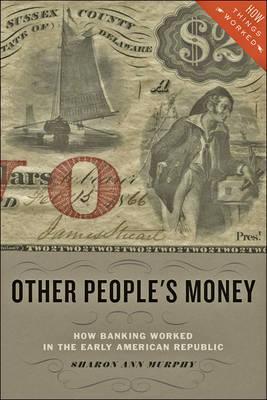Other People's Money

Other People's Money
How the contentious world of nineteenth-century banking shaped the United States.
Pieces of paper that claimed to be good for two dollars upon redemption at a distant bank. Foreign coins that fluctuated in value from town to town. Stock certificates issued by turnpike or canal companies--worth something . . . or perhaps nothing. IOUs from farmers or tradesmen, passed around by people who could not know the person who first issued them. Money and banking in antebellum America offered a glaring example of free-market capitalism run amok--unregulated, exuberant, and heading pell-mell toward the next "panic" of burst bubbles and hard times.
In Other People's Money, Sharon Ann Murphy explains how banking and money worked before the federal government, spurred by the chaos of the Civil War, created the national system of US paper currency. Murphy traces the evolution of banking in America from the founding of the nation, when politicians debated the constitutionality of chartering a national bank, to Andrew Jackson's role in the Bank War of the early 1830s, to the problems of financing a large-scale war. She reveals how, ultimately, the monetary and banking structures that emerged from the Civil War also provided the basis for our modern financial system, from its formation under the Federal Reserve in 1913 to the present.
Touching on the significant role that numerous historical figures played in shaping American banking--including Alexander Hamilton, James Madison, Benjamin Franklin, Henry Clay, Daniel Webster, and Louis Brandeis--Other People's Money is an engaging guide to the heated political fights that surrounded banking in early America as well as to the economic causes and consequences of the financial system that emerged from the turmoil. By helping readers understand the financial history of this period and the way banking shaped the society in which ordinary Americans lived and worked, this book broadens and deepens our knowledge of the Early American Republic.
PRP: 166.50 Lei
Acesta este Prețul Recomandat de Producător. Prețul de vânzare al produsului este afișat mai jos.
149.85Lei
149.85Lei
166.50 LeiLivrare in 2-4 saptamani
Descrierea produsului
How the contentious world of nineteenth-century banking shaped the United States.
Pieces of paper that claimed to be good for two dollars upon redemption at a distant bank. Foreign coins that fluctuated in value from town to town. Stock certificates issued by turnpike or canal companies--worth something . . . or perhaps nothing. IOUs from farmers or tradesmen, passed around by people who could not know the person who first issued them. Money and banking in antebellum America offered a glaring example of free-market capitalism run amok--unregulated, exuberant, and heading pell-mell toward the next "panic" of burst bubbles and hard times.
In Other People's Money, Sharon Ann Murphy explains how banking and money worked before the federal government, spurred by the chaos of the Civil War, created the national system of US paper currency. Murphy traces the evolution of banking in America from the founding of the nation, when politicians debated the constitutionality of chartering a national bank, to Andrew Jackson's role in the Bank War of the early 1830s, to the problems of financing a large-scale war. She reveals how, ultimately, the monetary and banking structures that emerged from the Civil War also provided the basis for our modern financial system, from its formation under the Federal Reserve in 1913 to the present.
Touching on the significant role that numerous historical figures played in shaping American banking--including Alexander Hamilton, James Madison, Benjamin Franklin, Henry Clay, Daniel Webster, and Louis Brandeis--Other People's Money is an engaging guide to the heated political fights that surrounded banking in early America as well as to the economic causes and consequences of the financial system that emerged from the turmoil. By helping readers understand the financial history of this period and the way banking shaped the society in which ordinary Americans lived and worked, this book broadens and deepens our knowledge of the Early American Republic.
Detaliile produsului










